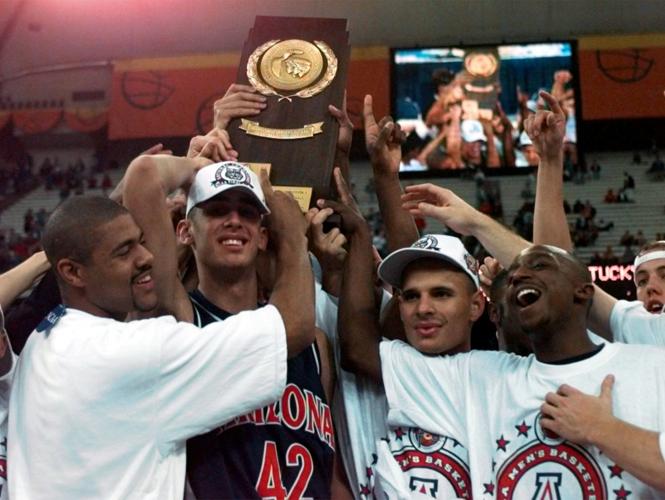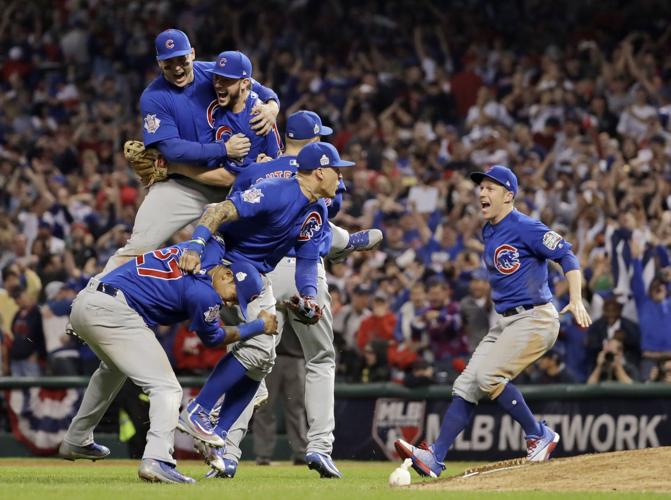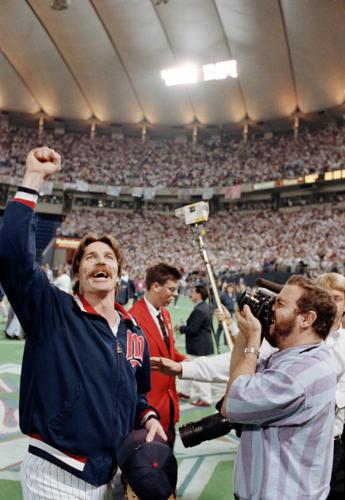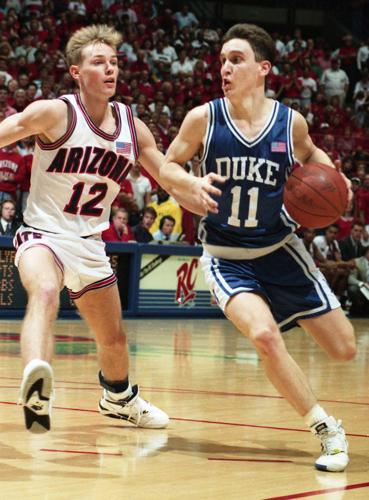Last week, Star sports staffers answered burning sports questions — from the best place to see a game to the one sporting event they can’t live without.
Star readers chimed in too, emailing their answers to sports@tucson.com. Here are excerpts of their responses. (Some have been edited for brevity, clarity and to match Star style).
Today’s question: What’s the most memorable game you’ve watched?
I was at Camden Yards when Cal Ripken broke Lou Gehrig’s record for consecutive games played Sept. 7, 1995. He hit a home run in the inn
ing before the game became official. You can’t write a better script. Then his run around the park high-fiving and tipping his hat to the crowd — EVERYONE in the stands was crying. EVERYONE. I still get chills thinking about it.
Tim White
Game 7 of the 1991 World Series. Twins vs Braves. 1-0 in 10 innings. Baseball at its absolute best.
I remember taping this game on my old VCR and when I put the label on the cassette I wrote “Best Game Ever”; that was back in 1991.
Bill Leith
My most memorable game is actually a series of games: The 1991 World Series with the Minnesota Twins against the Atlanta Braves.
It was memorable for several reasons — not only because I drove four hours each way from my home in northern Minnesota to see every Twins home game, but because the series was everything a series should be.
Every game was won by the home team. Four of the seven games were won by one run … Game 7 was a game for the ages. It was tied 0-0 at the end of nine innings, a first in World Series history.
In the eighth inning, each team had the bases loaded with one out and each time hit into a double play to end the inning. And incredibly, Jack Morris pitched all 10 innings for the Twins’ win! It was a remarkable way to end a remarkable series!
Barb Schueppert
It was the most memorable game I could NOT watch — only listen to intermittently: The Arizona- Kentucky 1997 NCAA Championship game! Why? At the time I was an American Airlines first officer flying our MD 80/Super 80 from Dallas Fort Worth to LaGuardia in New York City throughout the entire length of the game.
While level at 35,000 feet and on auto pilot, the captain and I would occasionally scan the one navigation radio in our cockpit that included the AM radio band searching for the broadcast somewhere — anywhere — just to get snippets of the play-by-play and score updates. I had researched likely stations before starting the trip, which proved very fortunate as we overflew Arkansas, Tennessee, Kentucky, West Virginia, Pennsylvania and finally New York City. Of course, the Kentucky Wildcats’ broadcast was especially intriguing to me as an Arizona Wildcats fan.
I would give occasional score updates to our passengers. The captain became an Arizona fan through it all.
We landed at LaGuardia during a snow shower and our gate was not immediately available. While parked on the tarmac waiting for our gate, we tuned in the New York City station with the broadcast and listened to the entire overtime victory by Arizona while containing our fan excitement and maintaining our crew responsibilities.
Finally our gate was assigned and the passengers disembarked and the hotel crew van took us to our nearby hotel, where we were able to watch most of the after-game excitement and festivities. I also called home to Tucson to our family watch party and joined in all their the postgame excitement as well.
Philip Bentley
Well, I grew up in Dearborn, Michigan. Naturally we were all Detroit Tigers fans. So, on June 24, 1962, myself, Mick and “Square Head,” a buddy and neighbor, decided to go see a Tigers ballgame (with our parents’ OK). … We had $4 each and got on the bus to go see the Detroit Tigers play the New York Yankees. Took the bus down Michigan Avenue, about 40 minutes … we got three center-field bleacher seats for $1.50 each.
Well, the game was the Tigers’ longest game in franchise history. It started at 1:15 p.m. and lasted till 8:30 p.m. However, we left early (because of) a parental curfew. The Tigers tied it 7-all in the sixth inning with Rocky Colavito’s home run (I used a Colavito glove in little league.
It brought me a lot of luck). Finally, a Norm Cash flyout ended it. We were able to see the greats: Maris, Mantle, Yogi, etc., and Detroit greats Calovito, Cash, Bunning, Al Kaline, etc.
Cornel Moga
I was just a little boy, not quite 5 years old, but I was attending my first baseball game with my Uncle Mike. Uncle Mike was a fireman in Brooklyn, and the Dodgers were his first love.
I doubt that there was ever a fan as fanatical as Uncle Mike. He was never willing to admit, years later, that the Dodgers had moved from Brooklyn to Los Angeles. We would be talking baseball, long distance, and if I ever accidentally referred to our team as “L.A.” He would always work “Brooklyn” into his reply.
But this happened back in happier days, before Walter O’Malley and the move across the country. Since Uncle Mike did not have children of his own, in effect he adopted me and my cousin Richard, the same age as me.
This was 1947, the year of a Dodgers-Yankees World Series and Richard and I were each going to our first major league baseball game!
Uncle Mike, baseball nut that he was, was not crazy enough to take two almost-5-year olds to the same game, so it was decided that Richard would go to Game 4, and I would go to Game 6.
This game was in Yankee Stadium — enemy territory, as I was informed even before we got on the subway. But it was so huge, so impossibly green, that it impressed a little boy so much that, to this day, I can close my eyes and see the field as I saw it for the first time.
All the way there, I heard that we would probably not see a game like cousin Richard had seen. Game 4 of the 1947 World Series was, of course, the famous near no-hitter by Yankees pitcher Bill Bevens.
It was broken up in the bottom of the ninth inning by a double by Cookie Lavagetto. … (It was) the Dodgers’ only hit of the game, but enough to score two runs in the 2-1 win.
No way we were going to match that game, or so my uncle thought. As for me, the huge green field and a steady stream of hot dogs, soda and popcorn, was much more interesting than whether this game was going to be as good as Game 4.
But I knew I was rooting for the Dodgers, who were down three games to two in the World Series and desperately needed to win today.
And there was a lot of hitting, unlike in Game 4. To my delight, the Dodgers scored four runs in the top of the sixth inning and were now leading, 8-5. Given all the hitting, the game was probably far more interesting to a little kid than the taut pitcher’s duel that my cousin Richard had seen in Game 4.
But then, in the bottom of the sixth, the Dodgers’ pitcher, Ralph Branca, began to get into trouble.
I could tell by the worried looks on the faces of the Dodger fans around us, that this sort of problem happened to the Dodgers regularly in October.
Two Yankees got on base, with two out, and in our section of the stands there was an undercurrent of, “Oh no, not him,” as the great Joe DiMaggio strode to the plate. … While while we revered Joe DiMaggio, and appreciated him as a great Italian ballplayer, we still didn’t want him coming to bat with two on in the sixth in a crucial game.
The Dodgers changed pitchers, bringing in Joe Hatten. I asked my uncle if he was a good pitcher, and he just grimaced. Uh, oh, I thought.
Then Hatten threw his first pitch, DiMaggio swung and there was a sharp crack. The ball was flying deep to center field, our worst fears realized. And then I saw this little man in a baggy uniform. I had not noticed him before, a substitute in left field for our team.
The little man was running back toward deepest center field as fast as he could run, turning once to look over his shoulder and then putting his head down and running to a spot in front of the bull pen, as if he knew just where the ball was coming down.
The ball was flying toward the bullpen and the little man ran and ran. … then, at the last second, without turning around again, and just as he arrived at the bullpen fence, he stuck his glove up, and the ball nestled in it for an out. He also had the good sense to twist his body as he caught it, so he hit the wall with his back, and not with the glove and ball.
The great DiMaggio was at second base by the time the catch was made, and he kicked the base in frustration, a rare display of temper for him. And I clearly recall my uncle’s flushed, exciting face, shouting at me, “Donnie, don’t ever forget you saw that catch!”
And I never have. The little man’s name was Al Gionfriddo, and after that sixth game, he never again played another inning of major league baseball. But he had made The Catch, and saved the game for the Dodgers, who went on to an 8-6 win to tie the series.
Seven years later, in another park, I would see the amazing Willie Mays of the Giants make another great catch in deep center field, off Vic Wertz in the 1954 World Series against the Indians. I would read columns by writers calling it the greatest catch of all time.
But I knew better: it was just the first great catch seen on national TV. Willie Mays was a Hall of Famer, and Al Gionfriddo was probably driving a delivery truck by this time, but the little man in the baggy uniform had made the greatest catch of all time, and the great Mays was just another pretender.
And I was there, both times.
Don Large
When the Seattle Mariners made the playoffs in 1995, my friend Mike Ritchie, who had season tickets a few rows up behind first base, told me that we were going to see all the playoff games, as long as they kept going.
Final game of the ALDS, bottom of the 11th, Mariners down by one. Joey Cora on second, Ken Griffey, Jr on first. Edgar Martinez got a solid hit down the left field line, and I was thrilled that they were going to tie the game.
But then, Oh, my God! Griffey just kept coming! He’s going to score! They say it was the hit that saved baseball in Seattle. The most exciting thing I’ve ever seen.
Chris Braaten
I’ve seen many memorable games in my life; Robin Yount’s 3,000 hit, Nolan Ryan’s 300th win, Henry Aaron’s last Home Run, Super Bowl XXI. But two remain my most memorable: the Ice Bowl, Dec. 31, 1967, the first NFL and Packers game my future wife attended.
I was actually colder at the last game Brett Favre played as a Packer, but I was also 40 years older.
When I was 16, the Wisconsin Badgers played in the 1963 Rose Bowl. A college neighbor and friends were driving out to California for the game. I asked my dad if I could go and he said, “The Badgers go to one about every fie years, so you’ll get there when in college.” I then made a vow: The next time the Badgers are in Rose Bowl, I’m there.
Fast forward 31 years, and the Badgers beat Michigan State in Japan to clinch the Big Ten Championship. Needless to say I was at 1994 Rose Bowl with my wife. Our daughter and friends drove out to game from Madison.
Camp Randall West is what we called Rose Bowl that year. The Badgers beat a UCLA team that had been ranked No. 1 most of the year. On Wisconsin!
Dave van Lieshou
The most memorable game I ever attended was (against) Duke here at McKale Center. It was on my birthday in February 1991, and the game went to double-overtime. No one sat the whole game, the crowd was electric and the Wildcats came through with the win! Just awesome.
Ray Deschenes
Without a doubt, Game 7 of the 2016 World Series! The game-tying home run by (Rajai) Davis, the rain delay and the final out, (Kris) Bryant to (Anthony) Rizzo! And my granddaughter was born that day! Couldn’t have been a better day!
Chuck Mellon
Being a Die-hard Cubs fan all my life, my most memorable game is of course the seventh game of the 2016 World Series. I went to Chicago to watch the games with my brother and nephews. Watched Games 3-6 at different bars and restaurants around Wrigley Field, and the excitement was just fantastic to experience.
It was at Millie’s Tavern where we watched the Cubs finally win the World Series. It was such a thrill to walk out that bar and be among all the Cubs fans celebrating the long-awaited victory and at the same time also sad thinking about my father, who was no longer around to celebrate with.
Howard Pastko
February 21, 1956. Saint Joseph’s University defeats Temple University to win the first Philadelphia “Big 5” basketball title in that group’s 50-plus-year history.
Jack Scheerin







